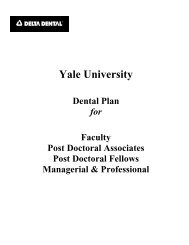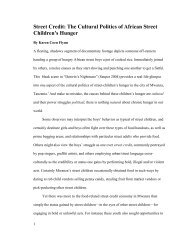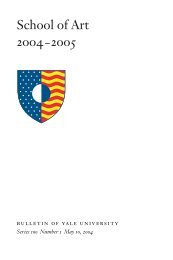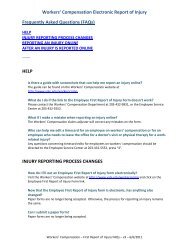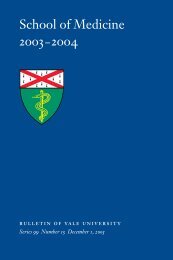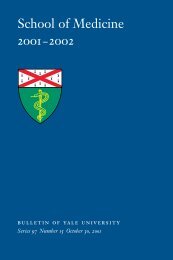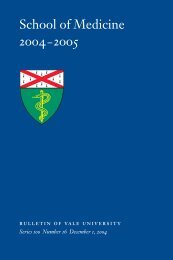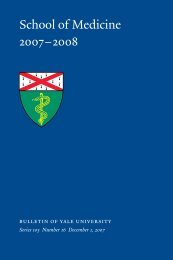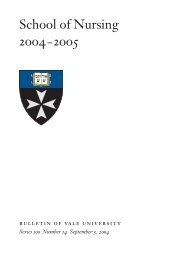bulletin 2002/nursing/pages.7 - Yale University
bulletin 2002/nursing/pages.7 - Yale University
bulletin 2002/nursing/pages.7 - Yale University
- No tags were found...
Create successful ePaper yourself
Turn your PDF publications into a flip-book with our unique Google optimized e-Paper software.
Course Listings5o1b, Issues in Nursing. 1.5 credit hours. The exploration of selected personal and professionalissues affecting the ability of a nurse to deliver professional <strong>nursing</strong> care. Contentincludes the history of <strong>nursing</strong>, as well as ethical, legal, cultural, and other policyrelatedaspects of <strong>nursing</strong> practice. Required for all students in the prespecialty year. Oneand one-half hours per week. C. Gilliss.5o3, Biomedical Science. 5 credit hours. Lectures focus on the basic scientific principlesof physiology and include an introduction to pathophysiology. Anatomical, biochemical,and developmental features are involved in discussion of the inseparable structural-functionalrelations within the human body. Topics include immunology, genetics,and embryology. Required for all students in the prespecialty year. Four hours per week,fall term; two hours per week through the middle of spring term. W. Zawalich.5o5b, Seminar in Pathophysiology. 2 credit hours. Didactic sessions focus on the synthesisand application of concepts related to pathophysiology and the treatment of disease.Required for all students in the prespecialty year. Two hours per week. W. Zawalichand guest faculty.5o7b, Nutrition in Clinical Practice. 1.5 credit hours. This course provides instructionin those aspects of nutrition fundamental to clinical practice, and the care and counselingof patients. Included are lectures and discussions on diet and health promotion,chronic diseases, weight regulation, eating disorders, pregnancy and early development,and more. The course also addresses behavior modification and effective counselingtechniques, and the determinants of human dietary behavior. The population and planetaryimpacts of nutrition are considered, including malnutrition, nutritional excess,nutrition programs and policies, and resource utilization. Required for all students in theprespecialty year. One and one-half hours per week. D. Katz.5o9, Introduction to Drug Therapy. 3 credit hours. This lecture course focuses on theappropriate clinical use of drugs. Emphasis is placed on pharmacology, side effects, pharmacokinetics,drug interactions, and the therapeutic use of medications. Required for allstudents in the prespecialty year. Integrated throughout the curriculum in the prespecialtyyear. G. Morrow, coordinator.511a, Fundamentals of Human Anatomy. 2 credit hours. This introductory courseincludes discussion of muscular, skeletal, respiratory, digestive, cardiovascular, urinary,endocrine, nervous, and reproductive systems as they pertain to the structure and functionof the human body. The course is supplemented by audiovisual materials andcadaver laboratories. Required for all students in the prespecialty year. One hour oflecture and three hours of lab per week. L. Pellico, coordinator; S. Kapadia, J. Sokolow,D. Zinn.




